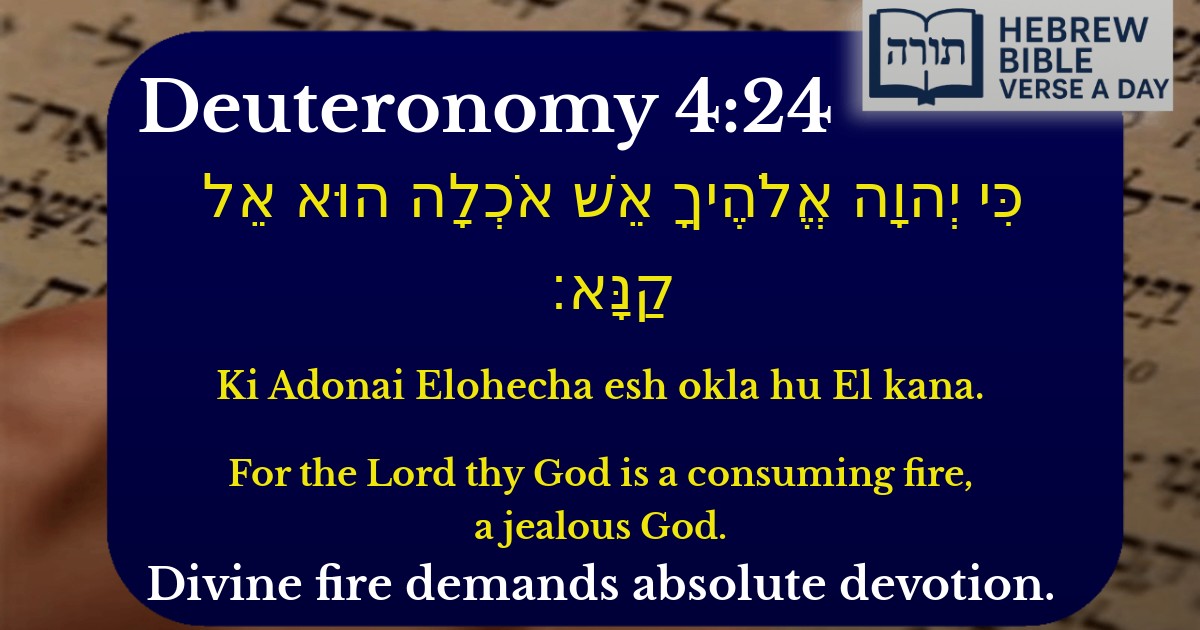Join Our Newsletter To Be Informed When New Videos Are Posted
Join the thousands of fellow Studends who rely on our videos to learn how to read the bible in Hebrew for free!
Hebrew Text
כִּי יְהוָה אֱלֹהֶיךָ אֵשׁ אֹכְלָה הוּא אֵל קַנָּא׃
English Translation
For the Lord thy God is a consuming fire, a jealous God.
Transliteration
Ki Adonai Elohecha esh okla hu El kana.
Hebrew Leining Text
כִּ֚י יְהֹוָ֣ה אֱלֹהֶ֔יךָ אֵ֥שׁ אֹכְלָ֖ה ה֑וּא אֵ֖ל קַנָּֽא׃ <span class="mam-spi-pe">{פ}</span><br>
כִּ֚י יְהֹוָ֣ה אֱלֹהֶ֔יךָ אֵ֥שׁ אֹכְלָ֖ה ה֑וּא אֵ֖ל קַנָּֽא׃ {פ}
🎵 Listen to leining
Parasha Commentary
📚 Talmud Citations
This verse is quoted in the Talmud.
📖 Sotah 31a
The verse is referenced in a discussion about the nature of God's jealousy and justice, illustrating how God's attributes are manifested.
📖 Sanhedrin 111a
The verse is cited in a broader discussion about divine punishment and the concept of God as a consuming fire in the context of judgment.


The Nature of Hashem as a Consuming Fire
The verse "כִּי יְהוָה אֱלֹהֶיךָ אֵשׁ אֹכְלָה הוּא אֵל קַנָּא" (Devarim 4:24) describes Hashem as a "consuming fire" and a "jealous God." Rashi explains that this metaphor emphasizes Hashem's intolerance for idolatry—just as fire destroys whatever it touches, so too does Hashem's wrath consume those who stray after foreign gods. The imagery of fire also conveys the idea that Hashem's presence is both awe-inspiring and purifying, as fire refines metal by burning away impurities.
The Concept of Divine Jealousy (קנאה)
The term "אֵל קַנָּא" (a jealous God) does not imply human jealousy but rather denotes Hashem's exclusive claim to Israel's devotion. The Rambam (Hilchos Avodas Kochavim 2:1-2) teaches that idolatry is the gravest sin because it violates the covenant between Hashem and His people. The Midrash (Sifri Devarim 32) compares this to a king who demands his bride's undivided loyalty—similarly, Hashem expects complete fidelity from Bnei Yisrael.
Lessons from the Metaphor of Fire
Practical Implications
The Chofetz Chaim (in his commentary on Chumash) derives from this verse that just as one would not casually approach a raging fire, we must approach avodas Hashem with reverence and caution. The metaphor reminds us that our commitment to Torah must be absolute, as any deviation risks provoking divine "jealousy" in the form of consequences for abandoning the covenant.